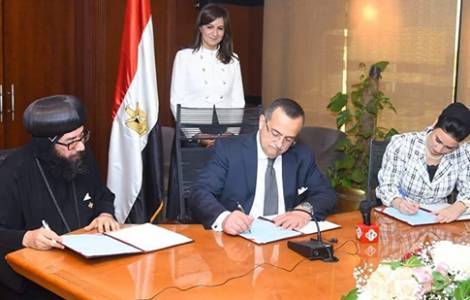
CoptsUnited
Cairo (Agenzia Fides) - "For a dignified life". This is the formula that expresses the inspiration and objectives of the protocol just signed by representatives of the Egyptian government and the Coptic Orthodox Church to promote projects and initiatives aimed at improving the living conditions in the villages scattered across the vast rural areas of the country. The signing ceremony of the Memorandum of Understanding also took place in the presence of Nabila Makram Abdel Shahid, Minister of Immigration and Egyptian Affairs Abroad, and Anba Julius, who currently heads the Department of ecumenism and social issues of the Coptic Orthodox Patriarchate. The protocol was also signed by Ms Aya Omar al Qamari, President of the Board of Directors of the Decent Life Foundation, third partner of the project which will be developed nationally with the aim of improving the standard of living in the areas the most economically and socially disadvantaged in the great North African nation. Ambassador Amr Abbas, Assistant to the Ministry of Immigration and Egyptian Diaspora Affairs Abroad, signed the draft on behalf of the government department. The underlying strategy of the project aims to involve Egyptian diaspora communities around the world as potential actors of economic support for social development projects in rural areas of the country. The initiative is aimed in particular at communities of Egyptian emigrants long rooted in the countries of North America and Europe, with the implicit aim of strengthening the not always serene relations between these communities and the Egyptian political power. On the sidelines of the signing of the protocol, Coptic Orthodox Bishop Julius - as reported by the Copts United news site - thanked the Catholic Church for the opportunity given to it to offer its cooperation to support a project aimed at to ensure full equality of Egyptian citizens in terms of possibilities of access to social services and better living conditions. The participation of the Coptic Orthodox Church in supporting the "Dignified Life" project, which is part of the "Egypt Vision 2030" sustainable development strategy sponsored by the current Egyptian political leadership, confirms the intensity with which the Egyptian Christian communities participate in the real dynamics of national life, far from the complaints about their "marginality" which characterize many statements by representatives of other Christian communities scattered in the Arab countries.
. The participation of the Coptic Church in the project shared with the government and the "Vita Dignitosa" Foundation also constitutes a test of the links and relations - marked also in the recent past by controversies and tensions - between the Coptic Orthodox Patriarchate and the Coptic Orthodox Patriarchate. diaspora communities. In August 2016, as Agenzia Fides reports (see Fides, 8/8/2016), Coptic Orthodox Patriarch Tawadros II publicly expressed his opposition to the demonstrations promoted in the United States by groups of the Coptic diaspora to protest against the sectarian violence recorded in previous months against Coptic Christian communities in various areas of Egyptian territory. This declaration was intended as a clear and authorized rejection of the planned demonstrations, in particular in the United States, where Coptic militants had organized a sit-in in front of the White House in July 2016. Coptic Orthodox communities are dispersed in at least 50 countries around the world. The Coptic Orthodox Bishops who carry out their ministry outside Egypt are more than 30. Some Coptic entrepreneurs "in diaspora" have achieved international recognition thanks to their initiatives. Among them, Naguib Sawiris, a leading global operator in the telecommunications sector. (GV) (Agenzia Fides, 16/11/2021)
 ASIA/LEBANON - General Abagnara (UNIFIL): “The Pope’s visit confirms us in our peacekeeping mission”
ASIA/LEBANON - General Abagnara (UNIFIL): “The Pope’s visit confirms us in our peacekeeping mission”